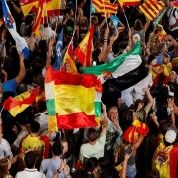The fracture and polarization that has marked the Spanish elections could be a premonition of the future that awaits the country’s democracy, regardless of whether socialists or the right-wing wins.

Related:
This possibility is already a defeat in itself, a defeat for everyone. But let’s not blame the Spaniards per se. Spanish democracy is part of a broader order, where Western political systems are having problems or great difficulties, to generate common agreements and consensus between opposing political ideas.
Coincidence points no longer interest anyone. And this is the first symptom of a weak democracy: political polarization.
Spain Elections: Results Show No Party With Enough Votes to Govern https://t.co/buJpicHIpd pic.twitter.com/rwL1HX5P35
— Pioneer Camp Group (@PioneerCampGrp) July 24, 2023
The electoral campaign that ends in the Iberian country, has perhaps reminded more than one, the confrontation between Republicans and Francoists, the terrible halo of the two Spains. A fertile political ground for political confrontation.
And if anything has characterized the social climate of this election period, it has been the clash between political factions, the deployment of an arsenal of discrediting and cartoons.
And we may ask ourselves, could something different be done, could any party dismount from this logics and aspire at the same time to achieve its campaign objectives. We don’t think so. These have been and will be different elections, precisely because they represent a phenomenon that transcends them: the current crisis of the world democratic system, fragmented, fractured and polarized to extremes.
Political polarization is both cause and effect of these same elections. The future looks like an extension of what has been experienced so far: the political arena, rather than being driven by the logic of lucid and accurate opposition, threatens to be characterized by irreconcilable ideological factions.
Political polarization is a danger for democracy to perform its main function: to ensure the political stability of the nations that implement it and to put all existing political resources to perfect the system in its socio-political competencies.
They got a divided Congress in the elections in Spain. pic.twitter.com/0uRnmfM1cw
— Carlos_S01 ���������� (@Its_Carlos_Here) July 24, 2023
And this is the great challenge for the left-wing if it wins the elections. Disengage from the polarizing discourse of the election period and fight to recover national unity within the democratic canons, otherwise its management will be, as never before, subject to political paralysis, reproducing the worst of the bipartisanship, and executive structures divided into two large groups.
The first thing is that polarization and constant confrontation cannot be transferred from politics to the streets. It cannot be replicated in daily life among Spanish citizens, which has been taken to the extreme in the field of high politics. One eventually generates the other.
There is also the harmful effect that the extreme ideologization of government management from any front has on democratic institutionality. This ends up affecting the trust of ordinary citizens in government agencies and entities, the suspicion that they go beyond the framework of legality and try to indoctrinate or manipulate their spaces of political autonomy and management of social life.
It is a danger that the PSOE has to overcome if it emerges as the winner. Not to be carried away by revenge or an ideological confrontation that would make it lose the confidence of its most lucid voters, and at the same time not to preach by example and drag its bases towards political hatred of the right wing or any other type of opposition.
Today it is necessary to safeguard this concept of civil society, which is admittedly precarious and ambivalent, and which goes beyond the major class contradictions and even certain types of stratum relations inherited from the past. It is necessary to govern with the concept of a civil society with full rights in mind. Even a concept as hackneyed but appealing as the concept of people contributes to this educational task.
Another phenomenon that has hit, hit and will hit the Spanish and global democratic integration is the great dispersion of communication and worldviews that exist in today’s society.
������ - #Spain: The scenario to form a government coalition is so chaotic, that two Spanish televisions are already saying that there will be new elections.
— ����The Informant (@theinformantofc) July 23, 2023
The possibility is great and the engagement of the electorate should be even greater, if it occurs.
The next few days will… pic.twitter.com/uovdEfgqNP
The high degree of automation in democratic societies is a real threat. The isolation of individuals, social groups, communities and even regions in packages of self-referential systems of ideas, without any interest in exposing them to society as a whole, in getting to know other different visions in search of common points.
Another campaign strategy that should be discarded with the conclusion of these elections is the speech that monopolizes the basic and fundamental values of democracy.
Only in extreme circumstances, when the political landscape forces it, will an all-out attack on the right wing be acceptable. It is necessary to let the opponent define its post-election attitude.
It is really harmful for the left wing to claim, beyond justified strategic purposes, the monopoly of the values of equality, equity and social justice.
Collective intelligence cannot be relinquished in the construction of a better society, beyond right wings and left wings, especially when we think of young people and their energy and hope for the future.
For this, a PSOE in power must promote equal opportunities, the permanent struggle for social welfare, and most importantly, good education and universal access to culture.
Functional illiteracy, ignorance and political immaturity are breeding grounds for polarization, confrontation and supremacist and monopolizing ideas of legitimacy.
This 23rd is a day of mixed emotions, of faith and of battles lived. Tomorrow, as soon as we have a winner, hopefully we will have one, another stage will begin, especially if we are to the left wing of democratic principles. That task will be and must be that of unity in diversity.